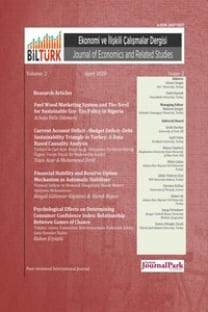Ekonomik Özgürlüklerin Yenilenebilir Enerji Üzerindeki Etkisinin Panel Veri Yöntemi ile İncelenmesi
Ekonomik Özgürlüklerin Yenilenebilir Enerji Üzerindeki Etkisinin Panel Veri Yöntemi ile İncelenmesi
The efforts of developing countries to achieve development and the efforts of developed countries to maintain their welfare levels are constantly increasing the demand for energy due to the growing population. The pressure to meet this increasing energy demand from renewable energy sources is also increasing due to environmental issues. However, on a global scale, the desired level of renewable energy has not yet been reached. In recent years, there has been a growing trend in academic research on this topic. Various studies have examined the factors that influence renewable energy determinants.One of the goals of this study is to examine the economic freedoms that affect the share of renewable energy in total energy consumption. The study used data from 146 countries for the years 2010-2019. The panel data analysis conducted in the study found that labor and monetary freedoms increase the share of renewable energy in total energy consumption, while freedoms in the investment and finance sector decrease it. Therefore, it is considered that the government can address the inverse effect in the investment and finance sector with incentives and guarantees.
Keywords:
Economic Freedoms Renewable Energy, Panel Data,
___
- Alola, A.A., Alola, U.V., Akdag, S. & Yildirim, H. (2022). The role of economic freedom and clean energy in environmental sustainability: implication for the G‑20 economies, Environmental Science and Pollution Research. 29: 36608–36615.
- Alola, A.A., Doganalp, N., & Obekpa, H. O. (2023). The influence of renewable energy and economic freedom aspects on ecological sustainability in the G7 countries. Sustainable Development, 31(2), 716–727.
- Amoah, A., Kwablah, E., Korle, K. & Offei, D. (2020). Renewable energy consumption in Africa: The role of economic well-being and economic freedom, Energy, Sustainability and Society. 10 (32): 1-17.
- Carlsson, F. & Lundström, S., (2003). The effects of economic and political freedom on CO2 emissions, Working Papers in Economics 29, University of Gothenburg, Department of Economics.
- Güney, T. (2017). Ekonomik özgürlük ve insani gelişmişlik, Hitit Üniversitesi Sosyal Bilimler Dergisi. (2): 1109-1120.
- Gwartney, J., & Lawson, R. (2003). The concept and measurement of economic freedom. European Journal of Political Economy, 19: 405-430.
- Gwartney, J., Lawson, R., Murphy, R., Abubaker, M., Celico, A., Hammond, A.C.R., McMahon, F., & Rode, M. (2023). Economic Freedom of the World 2023 Annual Report, Fraser Institute, Vancouver, B.C.
- Hanke, S. H., & Walters, S. J. (1997). Economic freedom, prosperity, and equality: A survey. Cato Journal, 17 (2): 117-146.
- Heritage Vakfı. (2023). https://www.heritage.org/index/. (29/07/2023).
- Işık, C., Simionescu, M., Ongan, S., Radulescu, M., Yousaf, Z., Rehman, A., Alvarado, R. & Ahmad, M. (2023). Renewable energy, economic freedom and economic policy uncertainty: New evidence from a dynamic panel threshold analysis for the G-7 and BRIC countries, Stochastic Environmental Research and Risk Assessment. 37: 3367–3382.
- Karagöl, E. T. & Kavaz, İ. (2017). Dünyada ve Türkiye’de yenilenebilir enerji. İstanbul: SETA | Siyaset, Ekonomi ve Toplum Araştırmaları Vakfı.
- Kim, B. A. (2023). 2023 Index of Economic Freedom. Washington: The Heritage Foundation and Dow Jones & Company, Inc.
- Koç, E. & Kaya, K. (2015). Enerji kaynakları - yenilenebilir enerji durumu. Mühendis ve Makina, 56 (668): 36-47. Majida, L. H., Majid, H. H. & Hussein, H. F. (2018). Analysis of renewable energy sources, aspects of sustainability and attempts of climate change. American Scientific Research Journal for Engineering, Technology, and Sciences, 43 (1): 22-32.
- Marinescu, C. & Fucec, A.A. (2014). The impact of economic freedom on renewable energy investments’ efficiency. International Multidisciplinary Scientific GeoConference Surveying Geology and Mining Ecology Management. 3 (5):447–454.
- Messick, R.E. (1996). World Survey of Economic Freedom, 1995-1996. New Brunswick: Freedom House and Transaction Publishers.
- Miller, A. T. & Kim, A. B. (2014). Chapter 7: Defining economic freedom, 2014 Index of Economic Freedom, Washington: The Heritage Foundation and Dow Jones & Company, Inc.
- Miller, T. & Kim, B. A. (2016). 2016 Index of Economic Freedom. Washington: The Heritage Foundation and Dow Jones & Company, Inc.
- O’Driscoll, G.P. Jr, Feulner, E.J. & O’Grady M.A. (2003). 2003 Index of Economic Freedom. Washington, DC: Heritage Foundation and Dow Jones and Company.
- Özbektaş, S. , Şenel, M. C. & Sungur, B. (2023). Dünyada ve Türkiye’de yenilenebilir enerji durumu ve kurulum maliyetleri. Mühendis ve Makina, 64 (711): 317-351.
- Sathaye, J. & Meyers, S. (1995). Greenhouse gas mitigation assessment: A guide book. Dordrecht: Springer Science Business Media.
- Shahnazi, Rouhollah & Shabani, Z. D. (2021). The effects of renewable energy, spatial spillover of CO2 emissions and economic freedom on CO2 emissions in the EU, Renewable Energy. 169: 293-307.
- Turkenburg, W.C., et al. (2000). Renewable energy technologies. UNDP/UNDESA/WEC: Energy and the Challenge of Sustainability. World Energy Assessment. New York: UNDP, 219-272.
- WDI. (2023). World Development Indicators. https://databank.worldbank.org/source/world-development-indicators. (22/06/2023).
- Yay, S. & Ezanoğlu, Z. (2023). Ekonomik özgürlükler ve ekonomik büyüme birbiriyle ilişkili midir? Genel değerlendirme ve Türkiye üzerine bir analiz. Fiscaoeconomia, 7(2): 1758-1784.
- Yayın Aralığı: Yılda 4 Sayı
- Başlangıç: 2019
- Yayıncı: Fatih DEYNELİ
Sayıdaki Diğer Makaleler
Ekonomik Özgürlüklerin Yenilenebilir Enerji Üzerindeki Etkisinin Panel Veri Yöntemi ile İncelenmesi
Türkiye’de Petrol ve Doğalgaz Fiyatlarının Makro Ekonomik Göstergeler Üzerindeki Etkileri
Fatih ÇEMREK, Hüseyin Naci BAYRAÇ
Türkiye’de Genç Nüfusun Eğitim ve İstihdam Durumuna Yönelik Sosyal ve Ekonomik Politikalar
